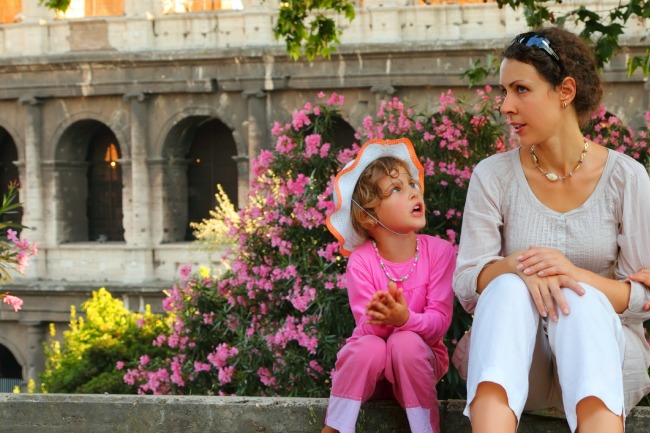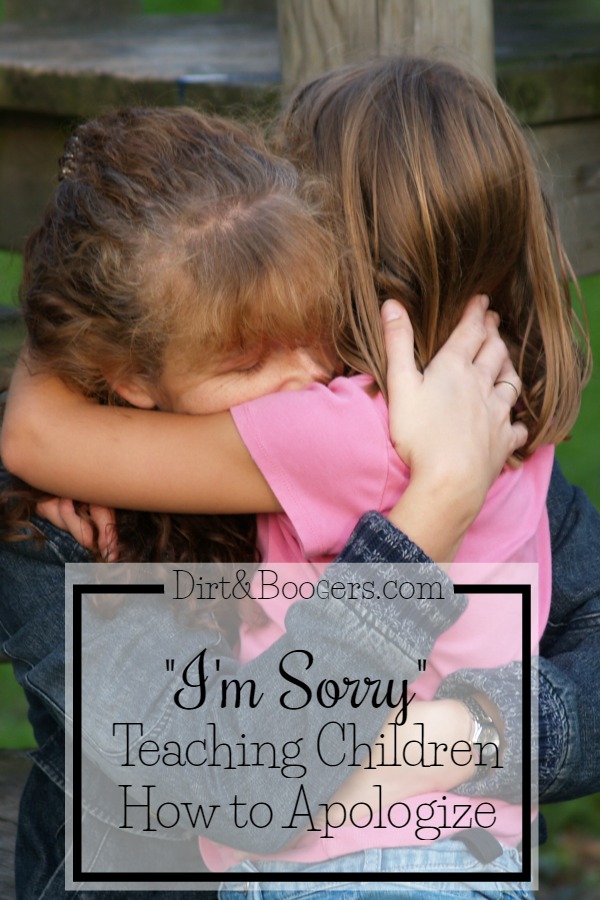I’ve written a few posts here about the fact that I apologize to my kids, and the circumstances around why I do it. I can honestly say that it truly helps my relationship with my children and teaches them lots of good social skills.
But when it comes to apologizing to kids, it can be tricky.
I want to tell them that I am sorry for the part I played, and not blame them for my decisions. You see, I’m not a fan of the “but you”.
“I’m sorry I yelled, but you weren’t listening”
“I’m sorry I was mean, but you hit me”
“I’m sorry I grabbed you, but you hit your brother”
Let me explain. When I apologize to an adult I don’t say I’m sorry, but you made me. I take responsibility for my own actions. I despise it when others apologize to me, but then still blame me for their behaviors.
I’m also not a big fan of kids saying “I’m sorry, but it wasn’t my fault”.
 When I think about how I want my children to learn to apologize, I don’t want them to think that it’s ok to say you’re sorry, yet blame the other person. I want them to learn to take responsibility for the part they played. So, it’s up to me to model that for them.
When I think about how I want my children to learn to apologize, I don’t want them to think that it’s ok to say you’re sorry, yet blame the other person. I want them to learn to take responsibility for the part they played. So, it’s up to me to model that for them.
But, it’s tricky. I don’t want them to think that because I’m apologizing their behavior is ok. But, I also don’t want them to think that my behavior is ok either.
So, I take responsibility for my mistakes, and expect for them to take responsibility for theirs.
It usually looks something like this…
I stick to the facts.
I name my feeling and tell them why I got angry.
“I got frustrated when you pushed your brother,”
I take responsibility.
“and it’s not ok that I yelled”
I let him know that I understand his feelings.
“I know what he did made you angry,”
Then, I let him know that what he did is not ok.
“but I won’t allow you to hurt your brother”
Then we focus on solving the problem.
I think it’s a good well-rounded approach, and it seems to be working for us…for now.
One of the best outcomes of this is that my son’s apologies are awesome. Sometimes he will still flippantly say “I’m sorry” without really any thought. But a lot of the time he’s sincere and he can tell me exactly why he’s sorry. Those are the times when I’m truly proud of my guy.
So, do you apologize to your kids? Do you ever say “but you…” when you do apologize? I’d love to hear your point of view on this.
Want to read about some of the times I’ve apologized?


Oh, I am bad at this! I tend to add that, “but you…” part in there and you are right, I don’t do that with adults. Definitely need to work on this!
I bet most people do, it’s hard not to! I’ve really had to practice and watch myself, especially when I’m angry about something. It’s possible not to though..just takes practice.
Yep, practice. I totally agree, it’s just so easy to do.
Isn’t that weird that we would never do that with an adult, but it’s so easy to do it to our own kids?
This post really has me thinking of how I apologise to my son. I’m afraid that I do indeed add “but” sometimes. Thanks for your practical suggestions and examples of what I can say instead. Great post!!
Such a great point Amanda! I catch myself doing this as well. My favorite behavior related books/articles that I have read involve thinking about how you would react if it was an adult. It always leads back to respecting our children, just like we would another adult!
To put two of your posts together, I notice that I stop apologising for my behaviour when I’m in a Mom funk. Then I feel like an insensitive, bad mother, and get funkier. Like cleaning when I only want to check Pinterest, biting the bullet and apologising sincerely and calmly seems to trigger an upward trend for both parent and child. My husband is a “sorry, but” person, a habit I am trying to break him of!
Yes!! The Mom Funk makes everything harder…even apologizing! Thanks for your insight.
I know I’ve added the “but you . . .” when apologizing to my son, too. Thanks for giving some practical advice for helping me to change this for the better!
Definitely something I struggle with, without adding the but … very aware at the moment how important it is for my 4 year old to see me accepting blame if she is going to have the confidence to say sorry meaningfully herself.
Hi Amanda! I love your blog and I agree that we need to model good social skills for our kids and build a positive relationship with them. Apologizing helps with that. I’m totally guilty of the “but you” and you’ve reminded me to be mindful of that. Thank you!
You’re welcome. I can sometimes struggle with the “but you”, it’s just so easy to do! I do find that the longer I go without saying it, the easier it gets.
Such a great article! My husband was the pro at “I’m sorry, but” and it used to make my blood boil. He’s gotten better because I’ve stressed that I don’t want our girls to do that. I’ve always managed to apologize well to them.:)
Thank you!
I do apologize to my three year old, often! I have the same struggle you shared. I don’t want my apology for my actions to excuse her behavior. I work hard to find ways to apologize and explain what she did. Thank you for offering language to help with this difficult piece of intentionality with our children!!
I find the apologising bit easy. I must do – my 2 year old now apologises to me when she is sorry for her behaviour. The difficulty I have is responding to her apology. Yes we should treat children with respect of course, but they are not adults and so apologies should be just a little different. We are modelling and guiding which is something we are not doing with our adult friends. Do I just forgive and cuddle? Should I thank her for apologising? I feel like if I just say ‘it’s ok, honey’ that I have not made sure her apology is genuine and that it’s easy to just say sorry to get mum off my back! But I don’t want to interrogate her either: ‘what are you sorry for? Will you do it again?’ Any ideas?
I usually say thank you for the apology, and tell them that I appreciate their thoughtfulness. I might take it further and say something like “It did hurt my feelings when you _____, and I am so thankful that you told me that you were sorry. What might be a better way to handle that problem next time?” It ads a bit of problem solving, as well as teaching empathy for other people’s feelings.
“But you” is a very valid point. I do apologize to my kids, and I find myself saying “but” when I’m trying to explain why I blew up to my son. Your point has changed the way I see that because it does sound like an excuse! No wonder kids say it….it’s another thing they hear from us!
I like the taking responsibility. That is oh so important. I agree.